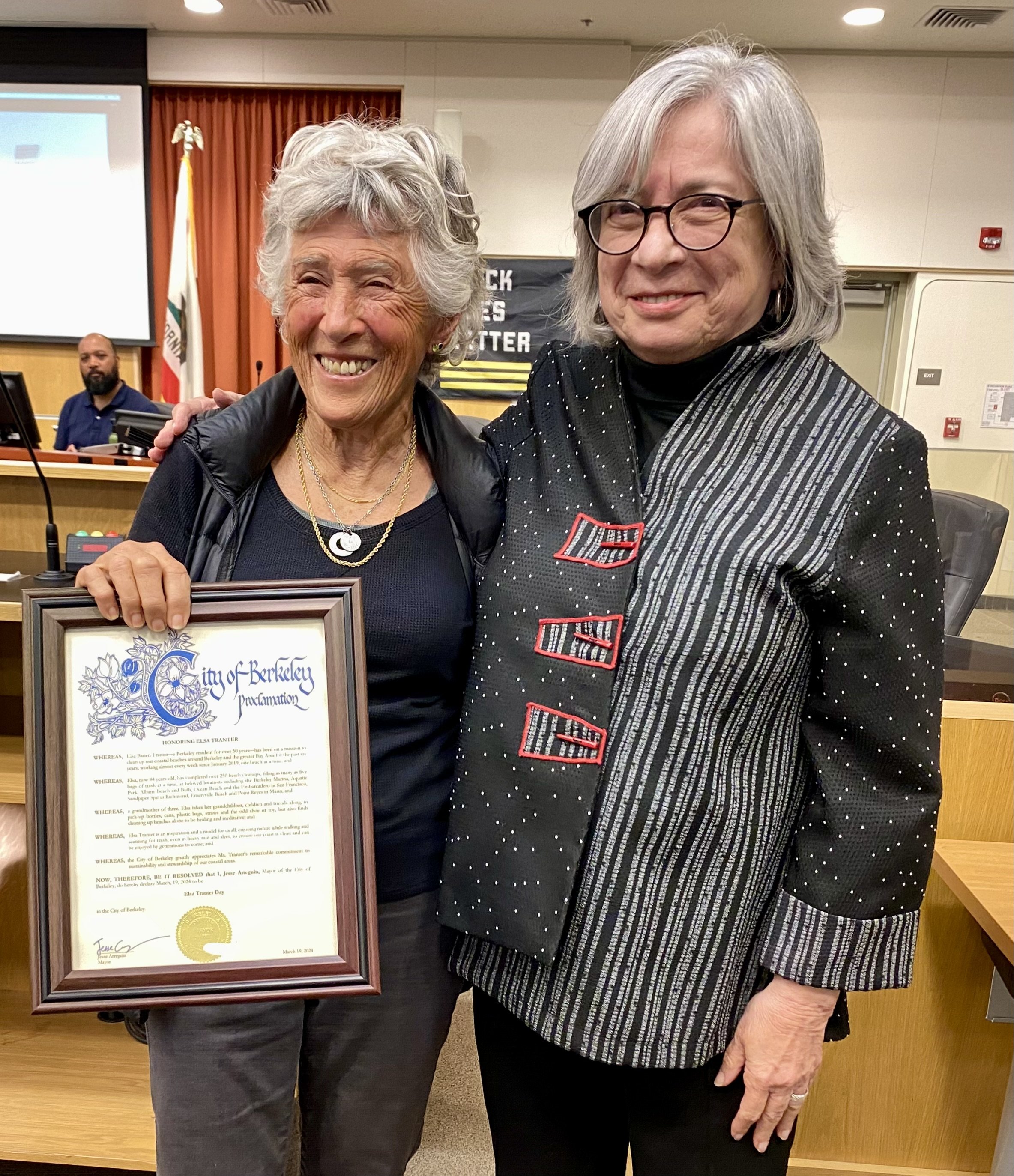Think back to what you were doing on March 19, 2024; whatever it was, you were doing it on Elsa Tranter Day in the City of Berkeley. That was when our friend Elsa Tranter was given a proclamation by the city council honoring her years of work cleaning up local beaches and roadways and naming the day for her.
You might know Elsa from her longtime affiliation with the Berkeley Path Wanderers Association, serving on the board for four two-year terms from 2008 to 2016. She frequently uses both Acacia Walk and Acacia Steps, both of which are near her home, but her current favorite path is Halkin Walk, between Euclid and Hilldale Avenues.
Elsa Tranter was nominated for a proclamation by City Councilwoman Susan Wengraf
“It's very, very steep, but when you get halfway up, there's a little sideways path with two low chairs right in the middle that you can sit on,” she says. “It gives a fantastic view of the Golden Gate Bridge, so it's a great place to watch the sunset, and you can sit down and have an unobstructed view. If I walk fast, I can get there in 12 minutes from my house, so I time it to get there just before sunset.”
Elsa and her husband, Revan, moved to Berkeley in 1973, where they raised two children and she worked in the Department of Sociology at UC Berkeley for 30 years. In 2018, she read about humor writer David Sedaris’s hobby of picking up litter near his home in the South Downs of England, and the following year she embarked on her own Great Bay Area Beach Cleanup. She figured the project would last a year, but when the year was up, she kept going.
At this writing, in mid-April, she was beginning week 272—that’s five years and three months, if you’re not near a calculator. She posts about her progress weekly on her Facebook page. She usually drops the collected trash in a nearby garbage can and brings home the recycling, so hasn’t kept track of the accumulated weight of her efforts. Nor does she track her steps, so can’t give a detailed account of miles walked.
“I just go until I get tired or until I have plans to go do something else,” she says. “But I always wish I could stay longer, because I really get caught up in doing it.” Her beach forays are usually two hours at the minimum.
The official term for what Elsa does is “plogging,” derived from the Swedish verbs plocka upp (pick up) and jogga (jog). One of her most frequent plogging sites is the length of bayfront between Gilman Street and University Avenue, just west of the soccer fields along Highway 80.
“It's convenient for me to drive to and easy to park,” she says. “At low tide you can get right down to the water, and at high tide there's a trail to walk on. If you look at the water line and start kicking around the rocks, there's always some plastic and other stuff to pick up.”
What’s Elsa’s favorite thing about plogging? “I love the ocean, being by the water, and I love walking,” she says. “The clean-up is just an added bonus, having something to focus your eye on while you're walking and breathing in the fresh air.” She also loves collecting shells, beach glass, and heart-shaped stones.
If Elsa could inspire similar efforts, she says she’d love to see a new Bay Area anti-litter campaign. “Don’t be a litterbug” was a common cause in the ‘50s and ‘60s, she says, but the message has gotten lost. It might greatly reduce the amount of trash for people like Elsa to pick up, but there will probably always be those forgotten water bottles, dropped bottle caps. Her work will never be obsolete. “It’s so satisfying to leave a place better than you found it,” she says. “I find it very meditative.”
You can read more about Elsa in the May 2019 and February 2021 issues of this newsletter, in a previous issue of Berkeleyside and in CBS News.


